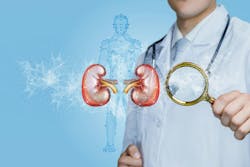Researchers from Johns Hopkins Medicine propose a novel approach to addressing the pressing issue of a kidney donor shortage through findings that suggest a promising method to expand the pool of available kidney donors by utilizing deceased donors on dialysis for kidney transplants.
The findings, published in the May 23rd issue of JAMA, identifies that while those who received such kidneys experienced a “significant delay” in the function of the transplanted organ compared to those whose donors did not have dialysis, there was no significant difference in rates of transplant failure or death.
For the study, researchers analyzed medical records for 1,944 kidney transplant patients gathered from 58 U.S. organ transplant organizations from the years 2010 and 2018 with 954 receiving kidneys from deceased donors who underwent dialysis and matched them to 990 receiving kidneys from deceased donors who had not undergone dialysis.
Results showed there was higher incidence of DGF in patients who received kidneys from donors who were deceased and who underwent dialysis than there was for patients with kidneys from donors who were deceased and who did not receive dialysis. However, the kidney recipients with higher DGF did not show any significant differences in long-term graft failure (permanent loss of function of the transplanted organ).

